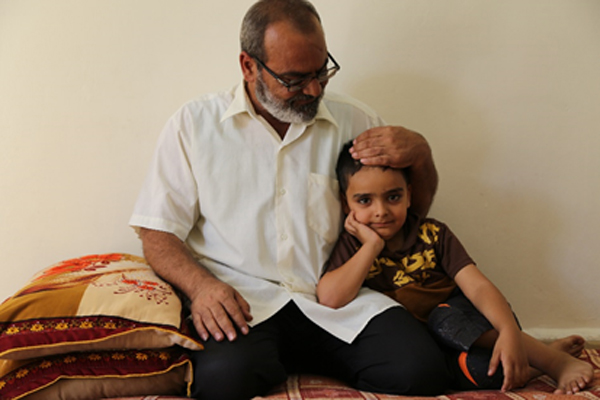Funding Shortfall Forces WFP To Announce Cutbacks To Syrian Food Assistance Operation

AMMAN – The United Nations World Food Programme (WFP) is warning that it is running out of funds to provide food for almost 6 million Syrians receiving its life-saving assistance. In Syria, the size of next month’s food ration will be reduced and in neighbouring countries the number of refugees receiving food or vouchers will be cut.
“We have reached a critical point in our humanitarian response in Syria and in neighbouring countries and unless we manage to secure significant funding in the next few days, I am afraid we will have no choice but to scale back our operation,” said Muhannad Hadi, WFP’s Regional Emergency Coordinator for the Syrian crisis.
WFP is funded entirely by contributions from governments, the private sector, other organizations and individuals. Hadi acknowledged that other emergencies were competing for donors’ attention and that aid budgets were stretched. But he said that in Syria, needs were still high and that the international community had made progress in recent weeks in gaining access to many people in hard-to-reach areas.
“The world has come together with huge generosity to provide food and other assistance over the last three years, and it is heart-breaking to think that we can no longer build on that investment that has given some stability to the shattered lives of so many people,” he added.
WFP requires US$352 million for its operations as a whole until the end of the year, including US$95 million for its work inside Syria and US$257 million to support refugees in neighbouring countries.
• In Syria from October, WFP will continue to provide food to more than 4 million people, but the food parcel will be smaller, providing less than 60 percent of the nutritional value recommended in emergencies in October and cutting even more in November. For December, WFP has no funding available for programmes in Syria.
• In Turkey, WFP’s monthly electronic voucher programme to provide food assistance to 220,000 Syrian refugees living in camps is only around 12 percent funded, and as many as 170,000 people may go without assistance in October.
• In Jordan, monthly assistance to around 440,000 refugees living in towns and villages will be reduced from US$34 to US$16, but support to camps will be maintained.
• In Lebanon from October, the value of the monthly electronic voucher will be reduced from US$30 to US$20 per person. Food parcels for new arrivals and vouchers for Palestinian refugees will be discontinued.
• In Egypt from October, only the most vulnerable will be assisted, and the caseload will be more than halved from 100,000 to 43,000 people. The value of food vouchers will be cut from US$30 to US$15 per month.
• In Iraq from October, the voucher value for the 70,000 refugees in Domiz camp will be reduced from US$31 to US$25, while food assistance for the 33,000 food assistance recipients in other camps will be maintained. School feeding for some 12,000 children has already been halted.
“If the food assistance stops, it would be disastrous!” said one disabled refugee, Ashraf. “I cannot work in Lebanon, like I used to do in Syria, to feed my family. What would I do? Beg to feed my family?”
Alia, from Homs, depends on an electronic “e-card” to buy food in local, Lebanese shops for her family of five. “Without the electronic blue card, I don’t know what we would do,” she said. “I wouldn’t want to think about it. It would be very hard for us, maybe impossible.”
Abou Anas and his family have been receiving WFP food vouchers in the Jordanian capital, Amman, and he, too, is deeply worried. “Imagine someone drowning,” he said. “You throw them a rescue float. They survive, but remain in the water. You suddenly decide to take it away. They die.”
Food security data in Jordan suggests that 85 percent of refugee families would not have the necessary financial resources to meet their food needs without assistance. WFP is concerned that without support, people will be vulnerable to exploitation and will resort to measures such as begging, sending children out to work or marrying girls off early.
# # #
WFP is the world's largest humanitarian agency fighting hunger worldwide, delivering food in emergencies and working with communities to build resilience. In 2013, WFP assisted more than 80 million people in 75 countries.
Follow us on Twitter @wfp_media and @wfp_mena
For broadcast-quality video, please contact: jonathan.dumont@wfp.org
For more information please contact (email address: firstname.lastname@wfp.org):
Abeer Etefa, WFP/Cairo, Tel. +202 25281730, Mob. +201066634352
Laure Chadraoui, WFP/Cairo, Mob. +2010 20084172
Joelle Eid, WFP/Amman, Mob. +962 79727 9403
Emilia Casella, WFP/Rome, Tel. +39 06 6513 3854, Mob. +39 347 9450634
Gregory Barrow, WFP/London, Tel. +44 20 72409001, Mob. +44 7968 008474
Bettina Luescher, WFP/New York, Tel. +1-646-5566909, Mob. +1-646-8241112
